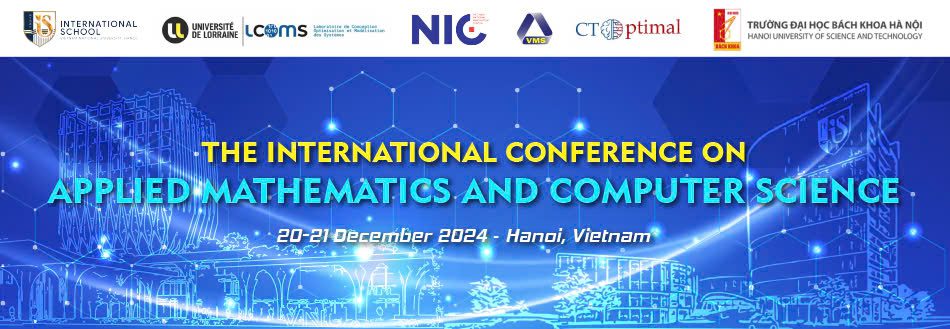Professor Panos PardalosUniversity of Florida, USA |
 |
Title: Introduction to data analytics for networks – a historical perspective and major advances
Abstract:
Data analytics for networks involves the use of advanced techniques and tools to extract insights and knowledge from large and complex datasets generated by network devices, applications, and services. This process involves collecting, storing, processing, and analyzing large amounts of data to identify patterns, trends, and anomalies that can provide valuable information for network operators. By leveraging data analytics, network researchers can make informed decisions about network planning, capacity management, service delivery, and customer experience. Additionally, data analytics can help network operators to detect and respond to security threats and attacks, by analyzing network traffic, identifying abnormal behavior, and detecting potential vulnerabilities. Overall, data analytics is a critical component of massive networks, enabling network researchers to extract valuable insights from massive datasets and improve network performance, efficiency, and security.
Brief bio:
Panos Pardalos was born in Drosato (Mezilo) Argitheas GR in 1954 and graduated from Athens University (Department of Mathematics). He received his PhD (Computes and Information Sciences) from the University of Minnesota. He is an Emeritus Distinguished Professor in the Department of Industrial and Systems Engineering at the University of Florida, and an affiliated faculty of Biomedical Engineering and Computer Science & Information & Engineering departments.
Panos Pardalos is a world-renowned leader in Global Optimization, Mathematical Modeling, Energy Systems, Financial applications, and Data Sciences. He is a Fellow of AAAS, AAIA, AIMBE, EUROPT, and INFORMS and was awarded the 2013 Constantin Caratheodory Prize of the International Society of Global Optimization. In addition, Panos Pardalos has been awarded the 2013 EURO Gold Medal prize bestowed by the Association for European Operational Research Societies. This medal is the preeminent European award given to Operations Research (OR) professionals for “scientific contributions that stand the test of time.”
Panos Pardalos has been awarded a prestigious Humboldt Research Award (2018-2019). The Humboldt Research Award is granted in recognition of a researcher’s entire achievements to date – fundamental discoveries, new theories, insights that have had significant impact on their discipline.
Panos Pardalos is also a Member of several Academies of Sciences, and he holds several honorary PhD degrees and affiliations. He is the Founding Editor of Optimization Letters, Energy Systems, and Co-Founder of the International Journal of Global Optimization, Computational Management Science, and Springer Nature Operations Research Forum. He has published over 600 journal papers, and edited/authored over 200 books. He is one of the most cited authors and has graduated 71 PhD students so far. Details can be found in www.ise.ufl.edu/pardalos
Panos Pardalos has lectured and given invited keynote addresses worldwide in countries including Austria, Australia, Azerbaijan, Belgium, Brazil, Canada, Chile, China, Czech Republic, Cyprus, Denmark, Egypt, England, France, Finland, Germany, Greece, Holland, Hong Kong, Hungary, Iceland, Ireland, Italy, Japan, Lithuania, Mexico, Mongolia, Montenegro, New Zealand, Norway, Peru, Portugal, Russia, South Korea, Singapore, Serbia, South Africa, Spain, Sweden, Switzerland, Taiwan, Turkey, Ukraine, United Arab Emirates, and the USA.
Prof. Le Thi Hoai AnUniversity of Lorraine and Academic Institute of France (IUF), France |
 |
Title: 40 years of developments of DC programming and DCA
Abstract:
On the occasion of the 40 th birthday of DC programming and DCA – powerful tools of nonconvex programming, this talk sketches the development of this field. We first provide a brief overview of the milestones and foundations of these tools, then focus on the novel results from the last ten years. Finally, we present a platform of DCA solvers, which includes numerous DCA based algorithms for tackling a wide range of non-convex optimization and machine learning problems, as well as many application problems in diverse domains such as logistics and supply chain, communication systems, finance, healthcare, cryptology, image processing, robotics, and more.
Brief bio:
Prof. Le Thi Hoai An earned her PhD with Highest Distinction in Optimization in 1994, and her Habilitation in 1997 both from university of Rouen, France. From 1998 to 2003 she was Associate Professor in Applied Mathematics at the National Institute for Applied Sciences, Rouen, and from 2003 to 2012 she was Full Professor in Computer Science at the University of Paul Verlaine – Metz. Since 2012 she has been Full Professor exceptional class, University of Lorraine. She held the position of Director of the Theoretical and Applied Computer Science Lab of University of Paul Verlaine and then University of Lorraine from 2008 to 2017. She is the holder of the Knight in the Order of Academic Palms Award of French government in July 2013. She was nominated a Senior Member of the Academic Institute of France (IUF) in June 2021, and received the 2021 Constantin Caratheodory Prize of the International Society of Global Optimization which rewards outstanding fundamental contributions that have stood the test of time to theory, algorithms, and applications of global optimization.
She is the co-founder of DC programming and DCA, power tools of non-convex programming and global optimization which were introduced by Professor Pham Dinh Tao in 1985 and intensively developed in their joint works since 1994. These theoretical and algorithmic tools, becoming now classic and increasingly popular, have been successfully applied by researchers and practitioners all the world over to model and solve their real-world problems in various fields.
She is the author/co-author of more than 300 journal articles, international conference papers and book chapters, the co-editor of 24 books and/or special issues of international journals, the supervisor of 40 PhD theses/Habilitation, and is the leader of several great joint projects in Industry 4.0 framework with Big companies including RTE (French transmission system operator) and NAVAL group (the European leader in Naval defence and a major player in marine renewable energies).
Prof.Dr. Pham Dinh Tao |
 |
Brief bio:
PHAM DINH Tao earned his Doctor of Sciences on Numerical Analysis and Optimization in 1981 from University Joseph Fourier-Grenoble I, France. Appointed Professor since 1989 at National Institute for Applied Sciences (INSA)-Rouen, France, he is currently Full Professor and Leader of the Team “Modelling, Optimization and Operations Research” (LMI) during the period 1989-2010. His research interests include Numerical Analysis, Optimization and Operations Research (and their applications in Data mining-Machine Learning, Bioinformatics, Image processing and Computer vision, Cryptology, Finance, Mechanics, Communication systems, Transport-Logistics, Petrochemical Engineering, Robotics and Optimal Control, Supply Chain and Management…) where he has introduced DC Programming and DCA in their preliminary form in 1985 and extensively developed, with Le Thi Hoai An, these theoretical and algorithmic tools since 1994 in order for them to become now classic and increasingly popularized by researchers and practitioners all the world over. He is the author of more than 210 papers, editor of 8 books and 10 Special Issues of International Journals, supervisor of 50 PhD theses. He has been Chair of many Scientific Committee and Chair of Organizing Committee of 6 International Conferences, Member of Scientific Committee of many International Conferences.
Prof. DSc. Ho Tu Bao |
 |
Tilte and abstract: ON THE DIGITAL MODE OF PRODUCTION IN DIGITAL TRANSFORMATION
Abstract
Vietnam is facing the demand for a revolution in digital transformation, leveraging science and technology to restructure production relations in alignment with significant advancements in productive forces. This digital transformation also necessitates the establishment of a ‘digital mode of production’. This talk explores our understanding of digital transformation and the digital mode of production, as well as the role of AI in this process.
Bio
is the Director of the Data Science Lab at the Vietnam Institute for Advanced Study in Mathematics (VIASM) and a Professor Emeritus at the Japan Advanced Institute of Science and Technology (JAIST), where he served as a Professor and the Head of the Machine Learning and Data Mining Lab from 1993 to 2018. He earned his Bachelor’s degree in Applied Mathematics from Hanoi University of Technology (1978), a Master of Science (1984), and a PhD (1987) in Artificial Intelligence from Pierre and Marie Curie University. In 1998, he completed his Habilitation à Diriger des Recherches at Dauphine University in France.
His primary research focuses on machine learning methods and their applications in medicine and other fields. His academic interests also encompass digital transformation, teaching mathematics, and integrating AI into various domains of education and the economy. He is participating in VNU-IS’s business data analytics program as a consultant and lecturer.
